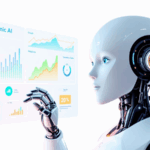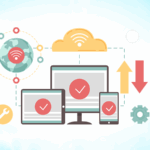From Concept to Launch: How SaaS Application Development Services Build Scalable Products
November 14, 2025 | 0 Comments
info@trickywebsolutions.com |
+1-225-276-2741
 USA
USA IN
IN
 SG
SG
 PT
PT
The conventional testing methodologies consume a lot of time and effort, and are prone to errors, making the entire process inefficient. The process generally demands several manual interventions from time to time, which increases the resource intensity of the process. All these issues can be mitigated by incorporating AI in QA and testing services, enabling organizations to streamline and enhance their entire testing processes. Today, in this blog, we will explore how AI in quality assurance is transitioning intensive manual testing methods into advanced automated testing solutions.
Artificial Intelligence has changed how testing is done in many organizations. AI testing tools integrated into our traditional software quality assurance methods offer a lot of key benefits to software testing teams as well as organizations. This leads to improved organizational productivity as well as eases the burden on testers. Companies that know how to implement AI in QA software testing services and leverage its benefits can achieve a distinct market advantage. However, to implement AI in quality assurance, one needs to leverage AI/ML capabilities and AI testing tools. This not only boosts speed but also minimizes errors and improves accuracy.
AI in QA uses artificial intelligence and machine learning concepts to enhance the software testing process. AI testing tools help companies automate a lot of manual tasks that take time and effort. Time-consuming and repetitive activities include AI test case generation and identifying errors that are common and frequently occur. AI makes the process less time-consuming by predicting possible issues that can occur and suggesting alternative improvements to implement. Here is how it helps:
Natural Language Processing (NLP) – This technology is used to give AI the ability to understand, parse, and respond to human language and its nuances. In QA, NLP helps AI to parse user specifications in plain language and translate them into automated test scripts.
Learning and Adapting – ML, an area of AI, enables systems to learn through experience without being programmed directly. For QA, this implies that the AI can be trained during repeated testing sessions. As time passes, it learns testing patterns and regularly refines suggestions toward better matching the organization’s particular requirements.
Computer Vision – It enables AI to examine and comprehend visual components so that any abnormalities or deviations in the user interface (UI) can be identified. For QA teams, it increases the precision of visual regression testing.
One of the most useful examples of AI in QA is AI test case generation. AI automates the process of generating diverse datasets to cover all the potential scenarios.
Checking the correct operation of discrete software components is essential to ensuring overall software quality. AI testing tools are used to automate the unit test generation process, covering most of the scenarios and boundary cases.
AI helps testers generate end-to-end automated test scripts that describe all the possible scenarios of how a user will interact with the application in different scenarios. This script covers all the test scenarios to ensure the components are working fine after integration.
Handling a large volume of test cases might be complex, but prioritizing the tasks based on the risks and the severity associated with each can help identify test cases that are most important to handle, maximizing their testing strategy.
Successful test running is reliant upon properly coordinated and timed scheduling of testing resources. AI assists in streamlining this function by maximizing resource use and timing test runs for optimal effectiveness.
The visual aspects of software programs are responsible for a major part of the user experience, and hence any inadvertent changes have a direct impact in a negative direction. Visual regression testing with AI helps out by comparing versions of the software and identifying visual differences.
Periodic software application updates tend to break test scripts, which leads to increased maintenance requirements. AI tools, on the other hand, modify and correct test scripts automatically whenever changes happen. Having this self-healing feature keeps tests current and in working condition. This enables QA teams to focus on higher-level tasks rather than manual script maintenance.
AI in Quality assurance also helps in predicting future possible issues and suggests improvements based on that. This allows team members to identify problems that can later become complex issues.
AI-driven testing software simulates human behavior, enabling teams to transition from manual testing to extremely precise, automated continuous testing. These technologies make the QA and testing services easier to execute with increased precision, credibility, and productivity. Some of the main benefits of incorporating AI testing tools into software testing services are provided below:
Development teams employ various strategies to speed up development of application and software delivery, and one key approach is introducing AI-driven enhancements into the testing process. Rather than going through tedious source code manually, AI can rapidly examine log records, code analysis, and detect defects within seconds. Unlike humans, AI is not fatigued, and that results in consistent and precise outcomes.
By incorporating AI in QA, development teams can scan similar apps and software to determine why they are successful in the market. These insights allow teams to comprehend better user expectations and industry norms, making it possible to create focused test cases to guarantee the app or software will run reliably with the intent of achieving specific goals.
Quality Assurance professionals often spend a lot of their time to design test case scenarios. AI powered QA automation tools simplify this process by analyzing the application, going through al ther screens and automatically generating and executing all the test cases, minimizing time spend on planning and designing.
The integration of AI in software quality assurance is challenging QA teams to broaden their skills. Testers are now acquiring high-end skills like natural language processing, business intelligence, mathematical optimization, and algorithmic analysis. The new skills allow teams to comprehend and use AI tetsing tools more effectively, enabling them to create more sophisticated and intelligent testing frameworks.
Recent Posts

From Concept to Launch: How SaaS Application Development Services Build Scalable Products
November 14, 2025 | 0 Comments

Agentic AI: The Rise of Autonomous Decision-Makers in a Human-Centric World
November 12, 2025 | 0 Comments

Empowering Growth: Cutting-Edge SaaS Application Development Solutions
November 10, 2025 | 0 Comments

Step into Web Design & Development: Creative Solutions That Elevate Your Presence
November 3, 2025 | 0 Comments

Supercharge Your eCommerce: Innovative Mobile App Development Solutions
October 31, 2025 | 0 Comments

Building the Future: Scalable & Agile Cloud Native App Development Solutions
October 30, 2025 | 0 Comments
Categories

We will zealously try to help you by providing technical support. We are open to inquiries or requests.
info@trickywebsolutions.com
1945 Brightside Drive, Baton Rouge, LA -70820
We are available for a friendly chat to discuss your business needs, no obligation.